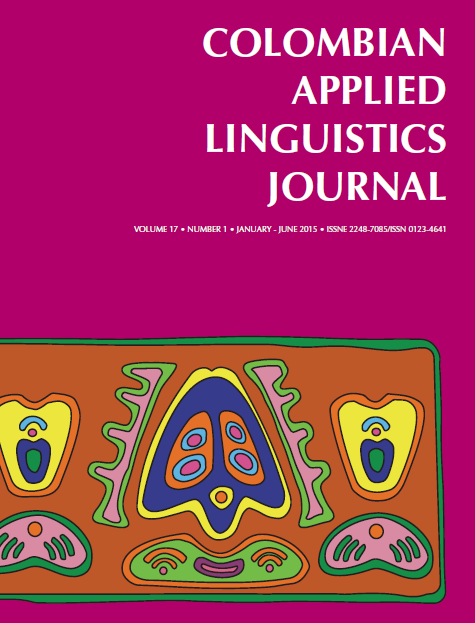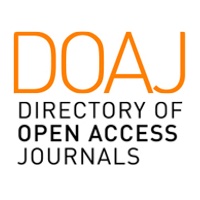DOI:
https://doi.org/10.14483/udistrital.jour.calj.2015.1.a06Published:
2015-05-06Issue:
Vol 17, No 1 (2015) January-JuneSection:
Research ArticlesDifferential effects of focused and unfocused recasts on EFL learners’ oral accuracy
Efectos diferenciados en la precisión oral de los aprendices del inglés como lengua extranjera
Keywords:
precisión, reformulación enfocada (intensiva), reformulación fuera de foco (extensiva) (es).Keywords:
Accuracy, focused (intensive) recast, uunfocused (extensive) recast (en).Abstract (en)
One of the limitations of meaning-focused instruction in the EFL context is that a communicative approach is not sufficient enough to ensure higher levels of oral accuracy. The purpose of the current study was to investigate the effects of two different focus-on-form techniques, unfocused and focused recasts, on EFL learners’ oral accuracy. Three pre-intermediate intact classes were randomly selected as the focused recast, unfocused recast, and control groups. In the focused recast group, the focus of correction was on simple past tense errors. In the unfocused recast group, the recast was provided for all errors. In the control group, there was no corrective feedback. Learners’ oral accuracy as the number of Error-free T-units per T-units was measured. One-way ANOVAs indicated that the differences among groups were only significant in sessions five and six. Tukey’s HSD (honest significant difference) indicated that the focused recast group outperformed both the unfocused and the control groups in these sessions and there were no significant differences between the other two groups. These findings suggest that focus on form can be an effective tool for the development of the oral accuracy in EFL situations. In addition, recasting learners’ oral errors could enhance oral accuracy.
Abstract (es)
Una de las limitaciones de la enseñanza centrada en el significado en el contexto EFL es que un enfoque comunicativo no es suficiente para garantizar un mayor nivel de precisión oral. El objetivo del presente estudio fue investigar los efectos de dos técnicas diferentes de enfoque en forma, reformulaciones desenfocadas y enfocadas, sobre la precisión oral de estudiantes de inglés como lengua extranjera (EFL). Tres clases pre-intermedias intactas fueron seleccionadas al azar como la reformulación enfocada, reformulación fuera de foco, y los grupos de control. En el grupo de reformulación enfocada, el foco de la corrección era en los errores en tiempo pasado simples. En el grupo de reformulación fuera de foco, se proporcionó la reformulación de todos los errores. En el grupo de control, no hubo retroalimentación correctiva. Se midió la precisión oral de los alumnos como el número de T-unidades por T-unidades sin errores. One-way ANOVA indicó que las diferencias entre los grupos sólo fueron significativas en sesiones de cinco y seis. El examen HSD (honest significant difference) de Turquía indicó que el grupo de reformulación enfocado superó tanto a los grupos fuera de foco y el grupo de control en estas sesiones y no hubo diferencias significativas entre los otros dos grupos. Estos hallazgos sugieren que la atención a la forma puede ser una herramienta eficaz para el desarrollo de la precisión oral en contextos de inglés como lengua extranjera. Además, reformular los errores orales de los alumnos podrían mejorar la precisión oral.
References
Carroll, S. (2001). Input and evidence: The raw material of second language acquisition. Amsterdam: Benjamines.
Carroll, S., & Swain, M. (1993). Explicit and implicit negative feedback: An empirical study of the learning of linguistic generalizations. Studies in Second Language Acquisition, 15(3), 357-366.
Dekeyser, R. (1998). Beyond focus on form: Cognitive perspectives on learning and practicing second language grammar. In C. Doughty, & J. Williams (Eds.), Focus on form in classroom second language acquisition (pp.42-63). Cambridge; Cambridge University Press.
Doughty, C, J., & Varela, E. (1998). Communicative focus on form. In C. J. Doughty, & J. Williams (Eds.), Focus on form in classroom second language acquisition (pp. 114-138). New York: Cambridge University Press.
Doughty, C. J., & Williams, J. (1998). Pedagogical choices in focus on from. In C. J. Doughty, & J. Williams (Eds.), Focus on form in classroom second language acquisition (pp. 197-261). New York: Cambridge University Press.
Ellis, R. (2001). Investigating form-focused instruction. Language Learning, 51(1), 1-46.
Ellis, R. (2003). Task based language learning and teaching. Oxford, UK: Oxford University Press.
Ellis, R. (2008). The study of second language acquisition. Oxford: Oxford University Press.
Ellis, R., Basturkmen, H., & Leowen, S. (2001a). Learner uptake in communicative ESL lessons. Language Learning, 51(2), 281-318.
Ellis, R., Basturkmen, H., & Leowen, S. (2001b). Preemptive focus on form in the ESL classroom. TESOL Quarterly, 35(3), 407-432.
Ellis, R., & Sheen, Y. (2006). Reexamining the role of recasts in second language acquisition. Studies in Second Language Acquisition, 28(4), 575-600.
Farrokhi, F., & Chehrazad, M. H. (2012). The effects of planned focus on form on Iranian EFL learners’ oral accuracy. World Journal of Education, 2(1), 70-81. http://dx.doi.org/10.5430/wje.v2n1p70
Hill, L. A. (1988). Steps to Understanding. Oxford: Oxford University Press.
Krashen, S. (1982). Principals and Practice in Second Language Acquisition. Oxford: Pergamon.
Leeman, J. (2003). Recasts and second language development: Beyond negative evidence. Studies in Second Language Acquisition, 25(1), 37-63.
Lightbown, P. M., & Spada, N. (1990). Focus on form and corrective feedback in communicative language teaching: Effects on second language learning. Studies in Second Language Acquisition, 12(4), 429-448.
Long. M. H. (1991). Focus on form: A design feature in language teaching methodology. In K. De Bot, R. Ginsberg, & C. K. Krasch (Eds.), Foreign language research in cross-cultural perspective (pp. 39- 52). Amsterdam: Benjamins.
Long. M. H. (1996). The role of the linguistic environment in second language acquisition. In W. C. Ritchie, & T. K. Bhatia (Eds.), Handbook of language acquisition (pp. 413-468). San Diego: Academic Press.
Long, M. H. (2000). Task based language teaching. Oxford: Blackwell.
Long, M. H., Ingaki, S., & Ortega, L. (1998). The role of implicit negative feedback in SLA: Models and recasts in Japanese and Spanish. The Modern Langue Journal. 82(3), 357-371.
Long, M. H., & Robinson, P. (1998). Focus on form: Theory, research and practice. In C. J. Dougthy, & J. Williams (Eds.). Focus on form in classroom second language acquisition (pp. 15-41). New York: Cambridge University Press.
Lyster, R., & Ranta, L. (1997). Corrective feedback and the learner uptake: Negotiation of form in communicative classrooms. Studies in Second Language Acquisition, 19(1), 37-66.
Lyster, R., & Satio, K. (2010). Oral feedback in classroom SLA: A meta-analysis. Studies in Second Language Acquisition 32(2), 265–302.
Mackey, A., Philip, J. (1998). Conversational interaction and second language development: recasts, responses, and red herrings? The Modern Language Journal, 82(3), 338-56.
Mehnert, U. (1998). The effects of different lengths of time for planning on second language performance. Studies in Second Language Acquisition, 20(1), 83-108.
Saito, K., & Lyster, R. (2012a). Effects of form-focused instruction and corrective feedback on L2 pronunciation development of /ɹ/ by Japanese learners of English. Language Learning, 62(2), 595–633.
Sharwood Smith, M. (1993). Input enhancement in instructed SLA: Theoretical bases. Studies in Second Language Acquisition, 15 (2), 156-179.
Skehan, P. (1996). A framework for the implication of task based instruction. Applied Linguistics, 17(1), 38-61.
Spada, N., & Lightbown, P. (1993). Instruction and the development of questions in L2 classrooms. Studies in Second Language Acquisition, 15(2), 205-224.
Swain, M. (1991). French immersion and its offshoots: Getting two for one. In B. Freed (Ed.), Foreign Language acquisition: Research and the classroom (pp. 91-103). Lexington, MA: Heath.
Swain, M. (1998). Focus on from through conscious reflection. In C. Doughty, & J. Williams (Eds.). Focus on from in classroom second language acquisition (pp.64-81). Cambridge: Cambridge University Press.
Trahey, M., & White, L. (1993). Positive evidence in second language classroom. Studies in Second Language Acquisition, 15(2), 181-204.
Yaghubi-Notash, M. (2007). Variability in L2: Exploring gender influence in task-prompted oral performance (Unpublished doctoral dissertation). University of Tabriz, Tabriz, Iran
Yang, Y. & Lyster, R. (2010). Effects of form-focused practice and feedback on Chinese EFL learners’ acquisition of regular and irregular past tense forms. Studies in Second Language Acquisition, 32(2), 235-263.
How to Cite
APA
ACM
ACS
ABNT
Chicago
Harvard
IEEE
MLA
Turabian
Vancouver
Download Citation
Metrics
License
This work is licensed under a Creative Commons Attribution-NonCommercial-NoDerivatives 4.0 International License.
Attribution — You must give appropriate credit, provide a link to the license, and indicate if changes were made. You may do so in any reasonable manner, but not in any way that suggests the licensor endorses you or your use.
NonCommercial — You may not use the material for commercial purposes.
NoDerivatives — If you remix, transform, or build upon the material, you may not distribute the modified material.
The journal allow the author(s) to hold the copyright without restrictions. Also, The Colombian Apllied Linguistics Journal will allow the author(s) to retain publishing rights without restrictions.













.JPG)










